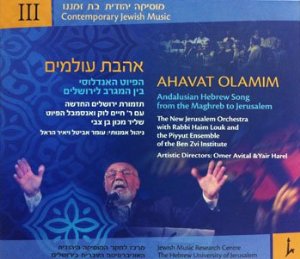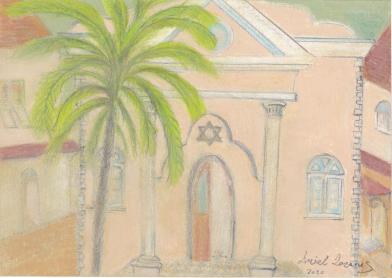2012
G. Fantasy- Tasdir Zarka
After the section of exile, redemption, wanderings, and love, we arrive at a section devoted to feantasy, inspiredd by the theme that connects the sections of Ahavat 'olamim and the performers' act of composition that pushes the artists' imagination to new spaces of multi-faceted, spirited sound. Interwoven in the introduction is a motif from the piyyut "Nura bey amram", which develops further and reaches new heights. Immediately following this, we hear a taqsim on the 'ud (by Armond Sabah), then a vocal opening that introduce the new nuba- Zarka (from the Algerian Andalusian tradition). The piyyut "Nura bey amram" by R. Natan Jian (19th c. Morocco) is a Moroccan Jewish bakkashah. On the surface, it sounds like an altercation between two friends who eventually find the path to reconciliation, but in fact, it is much more complex. The paytan begins with a Talmudic saying about the evil inclination, comparing it to burning fire. He then moves to the Torah, calling it a "spice" for the evil inclination; continues to the Jewish people and God; and ends with anticipation of the light of the Messiah and revelation of the Divine Presence. This Andalusian melody is unique to the Hebrew tradition, with character of a Moroccan qasida. After this, we hear a piyyut by R. Shlomo Ibn Gabirol, "Sha'ar petah dodi", in which the poet petitions to abandon captivity fir freedom. The melody is based on a most popular Moroccan qasida to this day, "Ana mali (or: mani) fiash" ("And I, about what should I complain?"), popularized by well-known singer Abdesadek Chekara (1931-1998). R Haim Louk begins the song in Arabic, with the words of the Moroccan qasida, and continues with the words of the Hebrew piyyut. This section concludes with the piyyut "Ya'alah, ya'alah" by R. Israel Najara, based on motifs from the Song of Songs. The poet describes this scriptural dialogue between a lover and his beloved, which Jewish tradition over the years has interpreted as a metaphor for the relationship between God and the people of Israel. Here as well, the piyyut is set to the melody of an Arabic song, The tempo develops from 4/4 to 6/8, and the climax is a trumpet solo (by Itamar Borochov) that leads to an ecstatic progression, inspired by songs traditionally sung in Morocco at celebrations honoring saintly rabbis.






